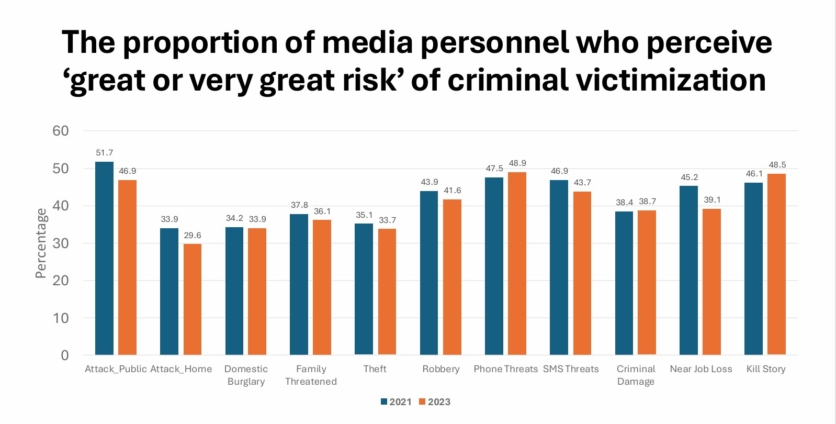adverts
A national survey conducted by Professor Justice Tankebe and Dr. Emmanuel Sowatey of the University of Cambridge, UK, has unveiled concerning threats to the safety of media personnel in Ghana.
The findings highlight a growing climate of fear and uncertainty, with journalists and media workers facing a broad spectrum of risks ranging from physical violence to threats directed at their families.
The survey reveals that nearly half of the respondents reported receiving threats through phone calls and messages. These findings are indicative of the pervasive nature of the threats confronting the media in Ghana.
adverts
In addition, many media professionals expressed fear of victimisation, citing concerns about physical attacks, unfair dismissals, robberies, and threats while carrying out their duties.
One of the most disturbing trends to emerge from the survey is the identification of certain topics as particularly risky for journalists to cover. Election campaigns, state violence, political corruption, and issues involving traditional authorities are perceived as the most dangerous subjects for media practitioners. These topics, often sensitive and politically charged, place journalists at significant risk of retaliation and violence.
Perhaps most alarming is the growing lack of confidence in institutions that should be protecting journalists. The survey found that many media workers feel let down by key bodies such as the police, employers, and the Ghana Journalists Association (GJA). There is a general sense of distrust in the ability of these institutions to safeguard media personnel from attacks or threats.
Key Findings: Widespread Threats and Low Confidence
The survey underscores several pressing issues:
- Prevalence of Threats: Half of the respondents reported receiving threats through phone calls and messages, illustrating the extent of the danger faced by journalists in Ghana.
- Fear of Victimisation: Journalists expressed fears of physical attacks, unfair dismissals, robberies, and threats, especially when covering controversial issues.
- Unsafe Coverage Topics: Election campaigns, state violence, political corruption, and issues involving traditional authorities are seen as the riskiest areas for reporting.
- Low Institutional Confidence: Many journalists indicated a lack of faith in key institutions—such as law enforcement and the judiciary—to protect them from harm or bring perpetrators to justice.
Policy Recommendations: A Call to Action
The survey’s findings have spurred a series of recommendations aimed at improving the safety and security of media professionals in Ghana:
- Police Protection Measures: The Ghana Police Service should establish a dedicated media safety unit to specifically address threats against journalists. This unit could enhance the safety of media workers and improve their confidence in law enforcement.
- Legislative Action: The survey calls on the government to enact laws that explicitly address crimes against media personnel. Such legislation would ensure that the protection of journalists is enshrined in the legal framework and that perpetrators of violence are held accountable.
- Judicial Commitment: The judiciary and the Attorney General’s Department must show a firm commitment to prosecuting crimes against journalists. Effective prosecution is essential to deter future attacks and maintain press freedom.
- Media Ownership Responsibility: Media owners must create safer workplaces for their employees, ensuring that journalists can report concerns and demand better working conditions without fear of retaliation.
- Support from the Ghana Journalists Association (GJA): The GJA is urged to provide safety training and legal support to equip journalists with the tools necessary to protect themselves and uphold their rights.
The survey’s findings highlight the precarious environment in which Ghanaian journalists operate, particularly during politically sensitive periods or when reporting on controversial issues. Without swift and decisive action from all stakeholders, the ability of the media to perform its critical role in promoting democracy and accountability will be compromised.
Professor Tankebe and Dr. Sowatey have called on the government, police, judiciary, and media organisations to prioritise the safety of journalists.
Their recommendations are crucial to preserving press freedom and strengthening democracy in Ghana. Ensuring the safety of media professionals is not only a matter of protecting individual journalists but also safeguarding the fundamental right of the public to receive free and unbiased information.
Read the full survey here:


